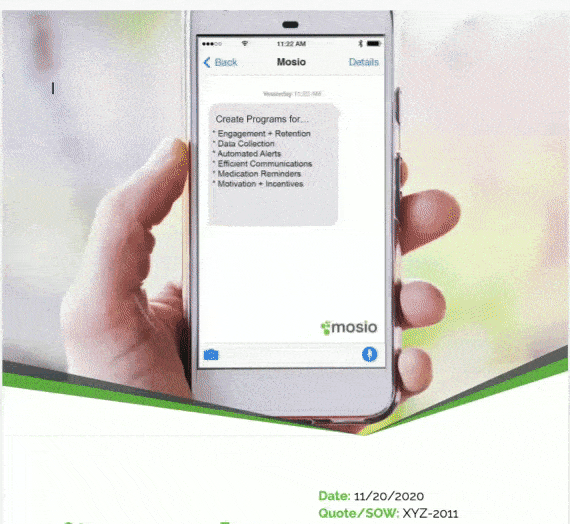Automated Clinical Study Communications Software is the Solution to Overworked Clinical Research Staff
Studies are showing that clinical research staff are overworked and have a higher burnout rate than ever before.
The compounding dysfunction and inefficiency of clinical research trials are a result of inadequate communication between staff and subjects. The solution? Automated study communications.
With automated reminders and notifications, research staff can stay on top of their normal tasks and keep subjects engaged in the process – leading to fewer no-shows, cancellations, and a renewed focus on the clinical research itself.
Our principal investigators are often very impressed by the immense possibilities of text messaging solutions for clinical research teams. From reminders to surveys to text-based interventions, automating communications with mobile’s most popular channel (text messaging) is a great tool to have in today’s clinical trials. A solution like Mosio can play a pivotal role in streamlining workflows and automating study communications.
As a centralizing force, a text messaging solution ensures that everyone on the research team is on the same page. You can quickly standardize processes, so everyone knows what needs to happen and when.
We’ll tell you more about Mosio later. Sorry, we couldn’t resist a grand opening!
Let’s take a step back and consider the effects of overworked clinical research staff.
Overworked Clinical Research Staff (4 Negative Effects)
Here are just some of the potential negative effects of overworking your clinical research staff:
1 – Higher staff turnover rates
When staff feel overworked, they are more likely to look for other employment opportunities. This increases turnover rates and costs your organization time and money in training new staff members.
2 – Compromised data quality
If staff are feeling overwhelmed, they may cut corners in data collection processes and fall short of the high standards required for accurate and reliable clinical research data.
3 – Disengaged study subjects
When subjects feel like they’re being treated as a number, rather than a person, they are less likely to comply with the study protocol and may even drop out of the trial entirely. This jeopardizes the success of the entire trial.
4 – Missed opportunities for process improvements
When staff are overworked, they often don’t have the time or energy to step back and assess ways to improve processes. It’s these moments of reflection and innovation that can lead to more efficient and effective clinical research trials.
The good news? You can largely mitigate these negative effects with automated study communications. With the support of a text messaging solution, your staff can focus on high-value tasks, rather than being bogged down by inefficient communication processes.
The Impact Of The “Great Resignation” On Clinical Research
With staffing shortages slowing down clinical research timelines and negatively impacting patients, it’s never been more important to find ways to retain research staff. As the pressure continues to mount and workloads grow ever larger, it’s inevitable that some highly-value clinical research team members will reach their breaking point and hand in their notice.
The impact of resignations can be significant, particularly in clinical research. The process of onboarding a new staff member is time-consuming and expensive, and there’s always a risk that they won’t work out and you’ll have to start the process again. Every time an employee resigns, it disrupts the flow of work and puts additional pressure on the team as they try to fill the void.
Reducing Clinical Research Staff Burnout (4 Steps)
1 – Offer professional development opportunities
To reduce staff turnover, it is important to offer ongoing professional training and development opportunities. This not only keeps your staff up-to-date with all the latest industry advancements but also provides a chance for them to learn new skills that they can apply to their current roles. Promoting professional development shows your staff that you are invested in their success.
2 – Incentivize employees
Another way to reduce staff turnover is to incentivize employees. This could include offering bonuses for meeting certain milestones or goals. You can even provide gift cards or other prizes for those who go above and beyond. Incentives reinvigorate employees and encourage them to take a sense of ownership over their work during a clinical research trial.
3 – Foster a positive work-life balance
A good work-life balance is essential for any employee, but it is especially important for those in the clinical research field. With long hours and demanding schedules, it is easy to burn out. That’s why it’s important to offer flexible work hours and opportunities for personal time. By fostering a positive work-life balance, you can reduce stress levels and raise team morale.
4 – Embrace automated communication
Automating communication with study subjects is one of the best ways to reduce clinical research staff burnout. By using a text messaging solution like Mosio, your staff can quickly and easily send reminders and notifications to study subjects. This not only keeps them engaged in the process but also frees up your staff’s time so they can focus on other tasks.
Automated Study Communications (How To Get Started)
With a single record of communication for each study subject, text messaging is the perfect way to engage and retain participants. Not only does this lead to better retention rates, but it also helps to reduce the overall workload for your staff. With a weight off their shoulders, clinical research teams have more time to review processes and assess new technology.
If every minute of every hour is jam-packed with tasks, it’s difficult to take a step back and objectively assess what’s working and what isn’t. By automating study communications, you can free up valuable time for your staff so they can focus on making improvements to the clinical research process and successfully executing research.
Get a free project plan from Mosio today and learn more about this software solution can support your clinical research.









